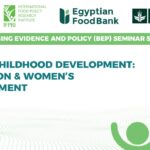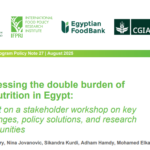The labor force participation rate for women in Egypt fell to 18% in 2023.[1] Among the major factors theorized to contribute to this low rate is women’s time spent on care work. While women’s childcare work is undervalued in national GDP accounting, early childhood is a critical stage in human development that shapes the trajectory for individuals’ health, learning, and overall wellbeing throughout their lives. This seminar will bring together completed and emerging research on drivers of women’s employment and time use on the one hand with research and policy discussion regarding early childhood nutrition, nurseries, breastfeeding, and early childhood education.
NEW PUBLICATION: Addressing the double burden of malnutrition in Egypt
Key messages Parliamentarians, researchers, and development practitioners shared perspectives on the double burden of malnutrition in Egypt in roundtable discussions. Infrastructure gaps and policy and research strategy fragmentation are highlighted as challenges to accessibility of healthy food. Aggressive ads/media environment and inefficient nutrition education programs are regarded as negatively impacting consumer behavior. Economic factors are widely identified as a major driver of malnutrition. Recommended solutions include raising nutrition literacy, transitioning from food subsidies to vouchers, improving nutrition services infrastructure, taxing unhealthy foods, and fortifying staple foods. Participants called for continued dialogue between researchers and policymakers.
NEW PUBLICATION: Food Policies and Obesity in Low- and Middle-Income Countries
Understanding the public health implications of food policies is crucial to combat recently increasing overweight and obesity rates in many low-and-middle income countries (LMICs). This study examines the implication of food policies, mainly tariff rates on “unhealthy” foods (sugar and confectionery products as well as fats and oils) and governments’ subsidies, on individuals’ body weight outcomes
NEW PUBLICATION: The Nutritional Benefits of Cash Transfers in Humanitarian Crises: Evidence from Yemen
This study makes use of a cluster randomized control trial that was left in place when a pilot cash-plus intervention evolved during the civil conflict into a major program within the Yemen Emergency Crisis Response program. The results provide uniquely rigorous evidence of the potential for long-run nutritional benefits of cash transfers in humanitarian crisis settings.
NEW PUBLICATION: Supporting Egypt’s safety net programs for better nutrition and food security, inclusiveness, and effectiveness
Over the years, IFPRI’s research, with support from PIM since 2012, has informed important decisions on Egypt’s key safety net programs, including the food subsidy and the national cash transfer programs. This note summarizes some of the most recent outcomes of this work.
- 1
- 2
- 3
- …
- 7
- Next Page »





